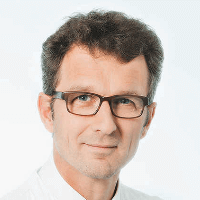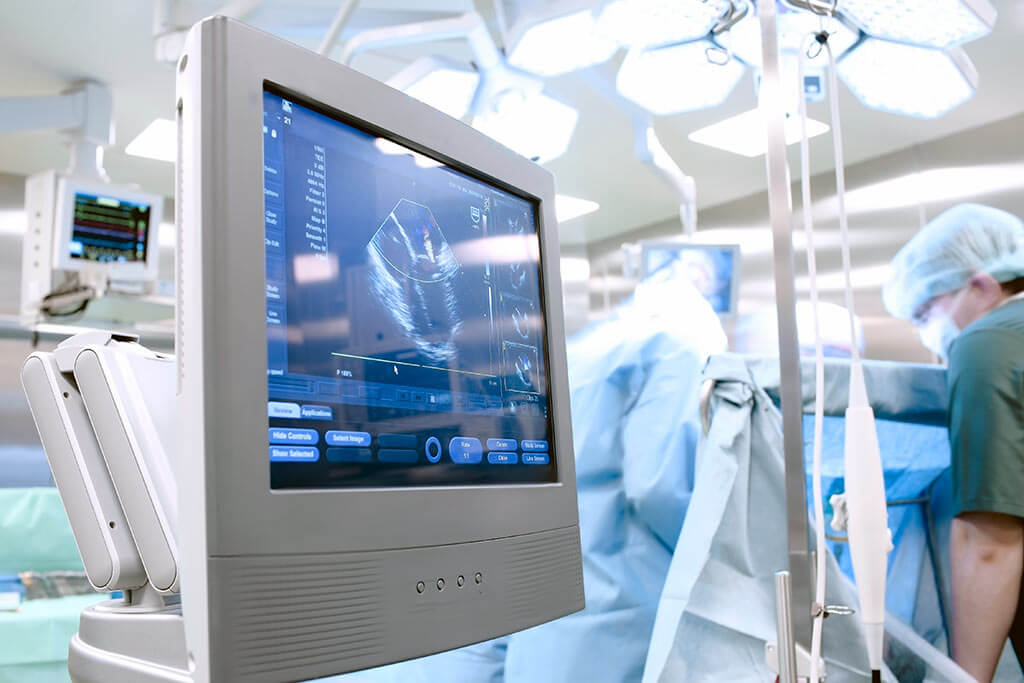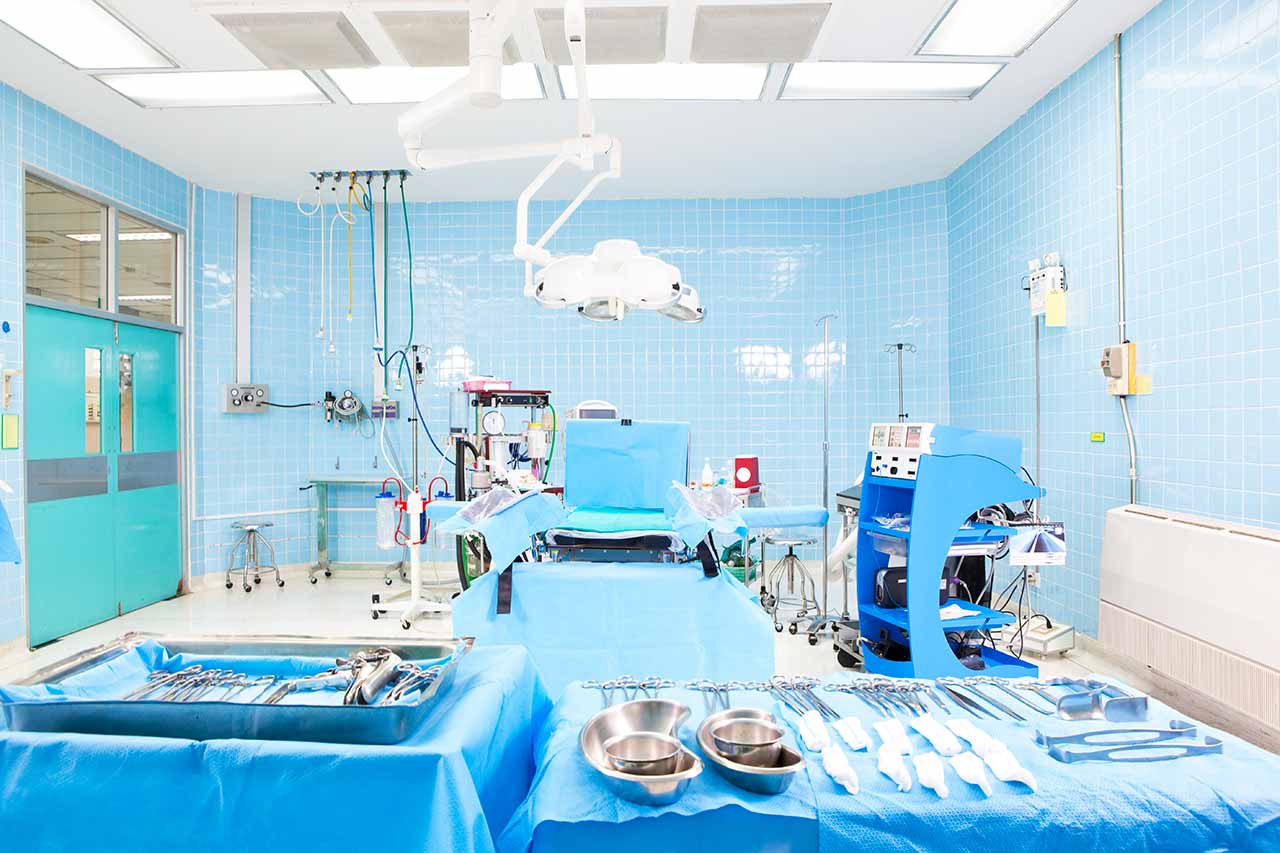
The program includes:
- Initial presentation in the clinic
- clinical history taking
- physical examination
- cardiac examination
- laboratory tests:
- complete blood count
- biochemical analysis of blood
- TSH-basal, fT3, fT4
- tumor markers
- inflammation indicators
- indicators blood coagulation
- measurement of arterial blood pressure
- ECG, echocardiography
- holter monitoring (24h)
- preoperative care
- pacemaker implantation
- symptomatic treatment
- control examinations
- cost of essential medicines and materials
- nursing services
- full hospital accommodation
- explanation of future recommendations
Required documents
- Medical records
- ECG (if available)
Service
You may also book:
 BookingHealth Price from:
BookingHealth Price from:
About the department
The Department of Cardiology at the Hospital Harlaching Munich provides the full range of diagnostic and therapeutic services for patients with cardiovascular diseases. Huge clinical experience and advanced equipment allow the doctors to effectively treat cardiac pathologies of varying severity. The department includes two modern Cardiac Catheterization Laboratories designed for both diagnostic catheter procedures and interventional treatment of coronary heart disease. In addition, the department operates a Chest Pain Unit certified by the German Cardiac Society. The Chest Pain Unit admits patients with acute coronary syndrome and myocardial infarction around the clock. The department's cardiologists cooperate closely with cardiac surgeons at the Hospital Bogenhausen Munich. In addition, the doctors from related medical disciplines, including angiologists, pulmonologists, gastroenterologists, neurologists and other specialists, are involved in the therapeutic process, if required. The department provides treatment to more than 2,700 patients every year. The Chief Physician of the department is Prof. Dr. med. Harald Kühl.
The department's cardiologists have advanced diagnostic equipment, which allows them to detect abnormalities in the heart functioning, make an accurate diagnosis and select the optimal treatment regimen for each patient. The department carries out such diagnostic tests as electrocardiography, 3D cardiac ultrasound, cardiac CT and MRI, coronary angiography, intravascular ultrasound, fractional flow reserve measurement, myocardial scintigraphy. The department's specialists also attach great importance to preventive examinations, which can detect changes in the functioning of the cardiovascular system at initial stages and prevent the development of life-threatening complications, for example, myocardial infarction or heart failure.
The department's cardiologists often admit patients with suspected coronary diseases, which significantly increase the risk of myocardial infarction. To make an accurate diagnosis, the patient undergoes a set of diagnostic tests – both imaging and interventional ones. If the diagnosis is confirmed, the department's specialists offer patients three effective catheter-assisted treatment methods. The first option involves balloon dilation to dilate the coronary artery lumen. The second treatment option is stent implantation, which allows the artery to dilate and thus ensures normal blood flow to the heart. The department's medical team uses drug-eluting stents and bioresorbable (self-dissolving) stents in their clinical practice, which are an innovation in modern cardiology. The last-line treatment for severe coronary artery disease is rotablation.
The treatment of structural heart disease is also one of the priorities of the department's doctors. The most common diseases in this area include congenital and acquired heart valve defects, atrial septal defects, patent foramen ovale and others. The diagnostics of structural cardiac pathologies involves the use of echocardiography, including 2D and 3D echocardiography, transthoracic and transesophageal echocardiography, stress echocardiography, CT, MRI and myocardial scintigraphy. In some cases, catheter-assisted diagnostics can also be conducted. If the department's specialists confirm any of the above mentioned pathologies in a patient, they start developing an optimal treatment regimen. Previously, the only effective treatment for structural heart disease was open surgery, which required thoracotomy and the use of a heart-lung machine. Today, such pathologies are successfully eliminated using interventional catheter-assisted techniques. For example, the department's cardiologists have extensive experience in the field of balloon valvuloplasty for the correction of aortic and mitral valve defects, MitraClip procedure for the treatment of mitral insufficiency, transcatheter aortic valve implantation and occluder placement to close atrial septal defect and patent foramen ovale.
The department's service range is complemented by the treatment of heart rhythm disturbances (arrhythmias). To confirm the diagnosis, the patient undergoes electrophysiological tests, 24-hour Holter monitoring or recording of the heart rate using an implantable loop recorder. The most effective type of treatment is determined depending on the type of arrhythmia, overall health of the patient, his age and other factors. The department's therapeutic options include the implantation of single- and dual-chamber pacemakers, defibrillators, catheter ablation, as well as the implantation of triple-chamber systems for cardiac resynchronization therapy.
The range of the department's diagnostic and therapeutic services includes:
- Diagnostics and treatment of coronary pathologies
- Diagnostic tests
- Echocardiography
- Cardiac computed tomography
- Cardiac magnetic resonance imaging
- Cardiac scintigraphy
- Intravascular ultrasound
- Fractional flow reserve measurement
- Diagnostic cardiac catheterization
- Therapeutic procedures
- Emergency care for acute myocardial infarction (around the clock)
- Treatment of cardiogenic shock
- Therapy with Impella circulatory assist device
- Rotablation for severe types of stenosis or coronary artery occlusion
- Percutaneous transluminal coronary angioplasty, implantation of drug-eluting stents and bioresorbable stents
- Balloon dilation
- Stent implantation for bifurcation lesion
- Diagnostic tests
- Diagnostics and treatment of heart disease
- Diagnostic tests
- Echocardiography, including 2D and 3D echocardiography, transthoracic and transesophageal echocardiography, stress echocardiography
- Cardiac computed tomography
- Cardiac magnetic resonance imaging
- Cardiac scintigraphy
- Therapeutic procedures
- Balloon valvuloplasty for aortic and mitral valve diseases
- MitraClip procedure for mitral valve diseases
- Transcatheter aortic valve implantation (in cooperation with cardiac surgeons at the Hospital Bogenhausen Munich)
- Occluder implantation for atrial septal defect and patent foramen ovale closure
- Interventional procedures for paravalvular leak closure after heart valve replacement
- Interventional closure of the left atrial appendage
- Diagnostic tests
- Diagnostics and treatment of arrhythmias
- Diagnostic tests
- Electrophysiological tests
- 24-hour Holter monitoring
- Recording of heart rate with an implantable loop recorder
- Therapeutic procedures
- Catheter ablation for atrial fibrillation using 3D mapping
- Catheter ablation for typical and atypical atrial flutter
- Catheter ablation for atrial tachycardia using 3D mapping
- Catheter ablation for Wolff-Parkinson-White syndrome
- Catheter ablation of the left ventricular outflow tract for symptomatic ventricular arrhythmias
- Implantation of single- and dual-chamber pacemakers
- Implantation of single- and dual-chamber defibrillators
- Implantation of of triple-chamber systems for cardiac resynchronization therapy
- Diagnostic tests
- Diagnostics and treatment of heart failure
- Diagnostic tests
- 2D and 3D echocardiography, transthoracic and transesophageal echocardiography, stress echocardiography
- Cardiac computed tomography
- Cardiac magnetic resonance imaging
- Cardiac scintigraphy
- Myocardial biopsy
- Therapeutic procedures
- Therapy using the Impella circulatory assist device for cardiogenic shock
- Implantation of single- and dual-chamber pacemakers
- Implantation of single- and dual-chamber defibrillators
- Implantation of triple-chamber systems for cardiac resynchronization therapy in severe heart failure and left bundle branch block
- MitraClip procedure for severe mitral regurgitation
- Transcatheter aortic valve implantation (in cooperation with cardiac surgeons at the Hospital Bogenhausen Munich)
- Diagnostic tests
- Other diagnostic and therapeutic options
Curriculum vitae
Higher Education and Professional Career
- 1985 - 1992 Study of Medicine at the Universities of Mainz, Erlangen and Aachen.
- 1992 - 1994 Assistant Physician, Department of Internal Medicine, Luisenhospital Aachen.
- 1994 Doctoral thesis defense at the Faculty of Medicine, RWTH Aachen University.
- 1994 - 2000 Assistant Physician, Department of Internal Medicine and Cardiology, University Hospital RWTH Aachen.
- 1999 Specialization in Internal Medicine.
- 2000 - 2001 Fellow at the University Hospitals in Leuven (Belgium) and Amsterdam (Netherlands), Grimmke Foundation Scholarship. Subject of the research project: "Cardiac imaging with magnetic resonance imaging".
- 2001 - 2009 Senior Physician, Department of Cardiology, Pulmonology and Angiology, University Hospital RWTH Aachen.
- 2002 Board certification in Cardiology.
- 2003 Habilitation and Venia legendi in Internal Medicine, Faculty of Medicine, RWTH Aachen University.
- 2004 Optional advanced training in Special Intensive Care.
- 2005 Theoretical foundations of the specialty in echocardiography and Doppler ultrasonography of extracranial vessels.
- 2006 Head of the Section for Cardiac Imaging Diagnostics at the University Hospital RWTH Aachen, Fellow of the European Society of Cardiology (FESC).
- 2007 Senior Physician with management responsibilities, Cardiac Catheterization Laboratory at the University Hospital RWTH Aachen.
- 2008 European certification in Cardiology and Extraordinary Professorship at the Faculty of Medicine of the RWTH Aachen University.
- 2009 Chief Physician of the Department of Cardiology at the Hospital Harlaching Munich.
Clinical Interests
- Interventional catheter-assisted heart interventions.
- Imaging diagnostics of the heart using ultrasound, magnetic resonance imaging and computed tomography.
Memberships in Professional Societies
- German Cardiac Society.
- Working Group on Echocardiography.
- Working Group on Cardiovascular Magnetic Resonance Imaging.
- European Society of Cardiology.
- European Association of Percutaneous Cardiovascular Interventions.
- Working Group on Chest Pain Care.
- German Society for Internal Intensive Care and Emergency Medicine.
- German Society of Internal Medicine.
Photo of the doctor: (c) München Klinik Harlaching
About hospital
According to the prestigious Focus magazine, the Hospital Harlaching Munich ranks among the top 20 medical centers in Bavaria, and is also one of the 100 best hospitals in Germany!
The medical complex provides top-class medical care, which meets modern European standards. The medical facility is an Academic Hospital of the Ludwig Maximilian University of Munich, thanks to which it has access to the very latest clinical achievements. The hospital is proud of its large bed capacity, which accounts for more than 700 beds. The doctors of the medical complex annually provide treatment to over 79,000 patients both on an inpatient and outpatient basis. The work of the hospital's medical team is based on an individual approach to each patient, since each patient and his clinical case are unique. The specialists develop individual medical programs, which allow them to achieve complete cure even in particularly complex clinical cases.
The hospital includes 17 specialized departments and many narrowly focused centers, including the Trauma Center, Breast Center, Gynecologic Cancer Center, Level I Perinatal Center, etc. The priority clinical activities of the medical facility include traumatology, neurology, gynecology and obstetrics, oncology, urology, pediatric and adolescent medicine. In addition, the doctors of the medical complex have long experience in the treatment of diseases of the cardiovascular system, kidneys and urinary tract, diseases of the gastrointestinal tract and lungs.
The hospital has been awarded the prestigious DIN EN ISO 9001:2015 certificate, which confirms the excellent quality of medical services and high patient satisfaction with medical care. The successful clinical activities of the hospital are also awarded with certificates from the German Cancer Society, the German Cardiac Society, the German Stroke Society, the German Trauma Society, the German Hernia Society and other specialized medical associations.
The patients of the hospital benefit from medical care by leading doctors in Germany with rich practical experience and excellent qualifications. The specialists devote enough time to personal communication with patients, strive to establish trust with them and do everything possible to ensure not only a successful treatment outcome, but also a pleasant stay in the hospital.
Photo: (с) depositphotos
Accommodation in hospital
Patients rooms
The patients of the Hospital Harlaching Munich live in comfortable single and double rooms with light colors. Each patient room has an ensuite bathroom with shower and toilet. The standard patient room furnishings include an automatically adjustable bed, a bedside table, a wardrobe, a table and chairs for receiving visitors. The bed has a built-in modern multimedia system with the help of which the patient can control the TV and radio. In addition, the multimedia system can be used to make telephone calls. Wi-Fi access is also available in the hospital. There is a ban on smoking in the hospital.
The patients can also live in enhanced comfort rooms. These patient rooms have additional toiletries, towels, hairdryer, safe, mini-fridge and upholstered furniture.
The hospital has a library with a wide selection of books for every taste, including audio books, magazines, DVDs and CDs.
The hospital also has a cozy cafe where the patients can have a tasty snack, enjoy a cup of aromatic coffee or hot tea with dessert.
Meals and Menus
The patient and the accompanying person are offered tasty and healthy three meals a day. The diet is quite varied. The restaurant of the hospital is certified in accordance with the DIN ISO 22000: 2005 quality standards, so the patients can be sure that when cooking the chefs use only the freshest and highest quality products.
If you are on a specific diet for some reason, you will be offered an individual menu. Please inform the medical staff about your dietary preferences prior to the treatment.
Further details
Standard rooms include:
Religion
The religious services are available upon request.
Accompanying person
During the inpatient program, the accompanying person can live with the patient in a patient room or a hotel of his choice. Our managers will help you choose the most suitable option.
Hotel
During the outpatient program, the patient can stay at the hotel of his choice. Our managers will help you choose the most suitable option.




